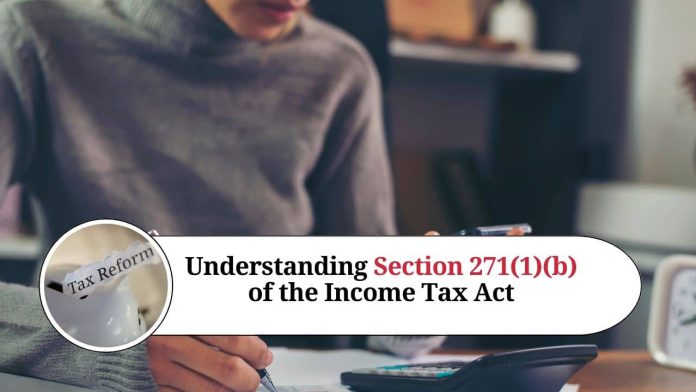The Indian Income Tax Act is a comprehensive tax law that governs the taxation of income earned by individuals, companies, and other entities in India. One of the key provisions of the Income Tax Act is Section 271, which deals with penalties for non-compliance with the provisions of the Act. In this blog, we will focus on Section 271(1)(b) of the Income Tax Act, which deals with the penalty for concealment of income.
What is Section 271(1)(b)?
Section 271(1)(b) of the Income Tax Act provides for a penalty if a taxpayer is found to have concealed income or furnished inaccurate particulars of income. The penalty amount is equal to the tax sought to be evaded or a sum of Rs.10,000, whichever is greater.
The provision of penalty under Section 271(1)(b) is aimed at deterring taxpayers from concealing income or furnishing inaccurate particulars of income. The penalty is levied in addition to any tax that may be due on the concealed income.
When is Section 271(1)(b) invoked?
Section 271(1)(b) can be invoked in the following situations:
- Concealment of income: If a taxpayer conceals income, i.e., does not disclose a part or the entire amount of income that is chargeable to tax, then he/she can be penalized under Section 271(1)(b).
- Furnishing inaccurate particulars of income: If a taxpayer furnishes inaccurate particulars of income, i.e., provides incorrect or false information in the return of income or in any other document submitted to the tax authorities, then he/she can be penalized under Section 271(1)(b).
It is important to note that the penalty under Section 271(1)(b) can only be levied if the concealment or furnishing of inaccurate particulars of income is willful or deliberate. If the taxpayer can prove that the concealment or furnishing of inaccurate particulars was not willful or deliberate, then no penalty can be levied.
How is the penalty calculated?
The penalty under Section 271(1)(b) is calculated as follows:
- If the taxpayer admits to the concealment of income or furnishing of inaccurate particulars of income during the course of assessment proceedings, then the penalty will be 50% of the tax sought to be evaded.
- If the taxpayer does not admit to the concealment of income or furnishing of inaccurate particulars of income, then the penalty will be 100% of the tax sought to be evaded.
- In cases where the taxpayer has concealed income or furnished inaccurate particulars of income but the tax authorities are unable to determine the amount of tax sought to be evaded, then the penalty will be a sum of Rs.10,000.
Conclusion
Section 271(1)(b) of the Income Tax Act is an important provision that aims to deter taxpayers from concealing income or furnishing inaccurate particulars of income. The penalty under this provision can be significant, and taxpayers must ensure that they comply with the provisions of the Income Tax Act to avoid being penalized. It is always advisable to seek professional guidance in matters related to taxation to ensure compliance with the law.
Other Related Blogs: Section 144B Income Tax Act
Frequently Asked Questions (FAQs)
Q:1 What is Section 271(1)(b) of the Income Tax Act?
A: Section 271(1)(b) of the Income Tax Act provides for a penalty if a taxpayer is found to have concealed income or furnished inaccurate particulars of income. The penalty amount is equal to the tax sought to be evaded or a sum of Rs.10,000, whichever is greater.
Q:2 What is the purpose of Section 271(1)(b)?
A: The purpose of Section 271(1)(b) is to deter taxpayers from concealing income or furnishing inaccurate particulars of income. The penalty is aimed at ensuring compliance with the provisions of the Income Tax Act.
Q:3 What is the penalty for non-compliance under Section 271(1)(b)?
A: The penalty under Section 271(1)(b) is equal to the tax sought to be evaded or a sum of Rs.10,000, whichever is greater. The penalty is levied in addition to any tax that may be due on the concealed income.
Q:4 What are the situations where Section 271(1)(b) can be invoked?
A: Section 271(1)(b) can be invoked in the following situations: (1) Concealment of income, and (2) Furnishing inaccurate particulars of income. However, the concealment or furnishing of inaccurate particulars of income must be willful or deliberate for the penalty to be levied.
Q:5 What is the penalty if the taxpayer admits to concealment of income or furnishing of inaccurate particulars of income?
A: If the taxpayer admits to the concealment of income or furnishing of inaccurate particulars of income during the course of assessment proceedings, then the penalty will be 50% of the tax sought to be evaded.
Q:6 What is the penalty if the taxpayer does not admit to concealment of income or furnishing of inaccurate particulars of income?
A: If the taxpayer does not admit to the concealment of income or furnishing of inaccurate particulars of income, then the penalty will be 100% of the tax sought to be evaded.
Q:7 Can the penalty be waived or reduced?
A: Yes, the penalty can be waived or reduced if the taxpayer can prove that the concealment or furnishing of inaccurate particulars of income was not willful or deliberate.
Q:8 How can a taxpayer avoid penalty under Section 271(1)(b)?
A: A taxpayer can avoid penalty under Section 271(1)(b) by ensuring compliance with the provisions of the Income Tax Act and by providing accurate and complete information in the return of income or any other document submitted to the tax authorities. Seeking professional guidance in matters related to taxation can also help in avoiding penalties.




















